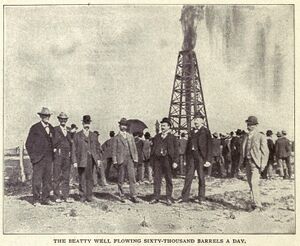Sweet crude oil (nonfiction): Difference between revisions
No edit summary |
No edit summary |
||
| Line 1: | Line 1: | ||
[[File:Beatty_oil_well.jpg|thumb|Beatty oil well.]]'''Sweet crude oil''' is a type of petroleum. | [[File:Beatty_oil_well.jpg|thumb|Beatty oil well.]]'''Sweet crude oil''' is a type of petroleum. | ||
The New York Mercantile Exchange designates petroleum with less than 0.42% sulfur as sweet. Petroleum containing higher levels of sulfur is called sour crude oil. Sweet crude oil contains small amounts of hydrogen sulfide and carbon dioxide. High-quality, low-sulfur crude oil is commonly used for processing into gasoline and is in high demand, particularly in the industrialized nations. | |||
The New York Mercantile Exchange designates petroleum with less than 0.42% sulfur as sweet. | |||
Petroleum containing higher levels of sulfur is called sour crude oil. | |||
Sweet crude oil contains small amounts of hydrogen sulfide and carbon dioxide. | |||
High-quality, low-sulfur crude oil is commonly used for processing into gasoline and is in high demand, particularly in the industrialized nations. | |||
Light sweet crude oil is the most sought-after version of crude oil as it contains a disproportionately large fraction that is directly processed (fractionation) into gasoline (naphtha), kerosene, and high-quality diesel (gas oil). | Light sweet crude oil is the most sought-after version of crude oil as it contains a disproportionately large fraction that is directly processed (fractionation) into gasoline (naphtha), kerosene, and high-quality diesel (gas oil). | ||
The term '''sweet''' originates from the fact that a low level of sulfur provides the oil with a mildly sweet taste and pleasant smell. Nineteenth-century prospectors would taste and smell small quantities of oil to determine its quality. | |||
The term '''sweet''' originates from the fact that a low level of sulfur provides the oil with a mildly sweet taste and pleasant smell. | |||
== In the News == | |||
= | <gallery mode="traditional"> | ||
File:Petroleum.jpg|Crude oil aspires to be [[Sweet, sweet crude oil]], launches Kickstarter campaign to fund taste-testing workshops. | |||
</gallery> | |||
== Fiction cross-reference == | == Fiction cross-reference == | ||
| Line 25: | Line 17: | ||
* [[Sweet, sweet crude oil]] | * [[Sweet, sweet crude oil]] | ||
== External links | == Nonfiction cross-reference == | ||
External links: | |||
[[Category:Nonfiction (nonfiction)]] | [[Category:Nonfiction (nonfiction)]] | ||
[[Category:Materials (nonfiction)]] | [[Category:Materials (nonfiction)]] | ||
Revision as of 08:06, 20 June 2016
Sweet crude oil is a type of petroleum.
The New York Mercantile Exchange designates petroleum with less than 0.42% sulfur as sweet. Petroleum containing higher levels of sulfur is called sour crude oil. Sweet crude oil contains small amounts of hydrogen sulfide and carbon dioxide. High-quality, low-sulfur crude oil is commonly used for processing into gasoline and is in high demand, particularly in the industrialized nations.
Light sweet crude oil is the most sought-after version of crude oil as it contains a disproportionately large fraction that is directly processed (fractionation) into gasoline (naphtha), kerosene, and high-quality diesel (gas oil).
The term sweet originates from the fact that a low level of sulfur provides the oil with a mildly sweet taste and pleasant smell. Nineteenth-century prospectors would taste and smell small quantities of oil to determine its quality.
In the News
Crude oil aspires to be Sweet, sweet crude oil, launches Kickstarter campaign to fund taste-testing workshops.
Fiction cross-reference
Nonfiction cross-reference
External links:

